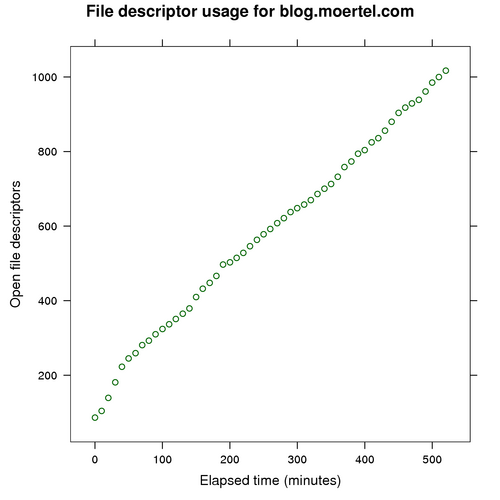In an earlier post I wrote about stability problems that have plagued my blog since upgrading from Typo 4.0.0 to 4.0.3. I have finally traced the problem to its source, and here’s the deal:
If you’re serving Typo up via Mongrel, do not configure ActiveRecord to allow concurrency.
One of the changes between Typo 4.0.0 and 4.0.3 is this
addition to the environment.rb file:
config.active_record.allow_concurrency = trueComment out this line, restart Typo, and the problem is solved.
Apply Changeset 1255, and the problem is solved. (See
Update 2, below.)
Discussion
When ActiveRecord::Base.allow_concurrency is set to
true, AR will give each thread its own database
connections and cache them in thread-localized storage. The idea is
that, in a multi-threaded environment, this simple policy prevents
unsafe interactions between threads and the database. (Imagine what
would happen if one thread “borrowed” a connection over which
another thread had opened a transaction. Oops, there goes
transactional isolation.)
This policy, however, does place a burden on the owner of the threads to make sure that each thread’s local connection cache is cleared when the thread is joined, a burden that is not, it would seem, being carried by Typo under Mongrel. As a result, Typo rapidly chews through the allotment of file descriptors that the operating system kindly had reserved for Mongrel:

(On my Linux server, the Mongrel process gets an allotment of 1024 file descriptors.)
Lucky for us, this each-thread-gets-its-own-connections policy is unnecessary under Mongrel because Mongrel, while being multi-threaded itself, serializes all access to the Rails-based applications it serves up:
Q: Is [Mongrel] multi-threaded or can it handle concurrent requests?
Mongrel is uses a pool of thread workers to do it’s processing. This means that it is able to handle concurrent access and should be thread safe. This also means that you have to be more careful about how you use Mongrel. You can’t just write your application assuming that there are no threads involved. …
Ruby on Rails is not thread safe so there is a synchronized block around the calls to Dispatcher.dispatch. This means that everything is threaded right before and right after Rails runs. While Rails is running there is only one controller in operation at a time.
(Source: Mongrel FAQ list)
Thus we can safely turn off (i.e., comment out in Typo’s
environment.rb file) ActiveRecord’s allow-currency option
without having to worry about nasty concurrency or performance issues:
# the following line is commented out
# config.active_record.allow_concurrency = trueFor more on this subject, see Rails ticket #2162 and Rails ticket #2742.
Now, here’s my question: Are there any environments in which Typo can run with the allow-concurrency option enabled and not leak database connections? Inquiring minds want to know.
Update: Upon further investigation, turning off concurrency might not be altogether without risk. Some of the Typo code that handles potentially long tasks, such as making trackbacks and pings, spawns new threads in which to carry out its work. I’m looking further into this risk. Updates to come.
Update 2: Piers Cawley added Changeset 1255, which turns AR’s allow-concurrency flag back off and revises the ping code so that it does not attempt concurrent database access. Apply the patch version of 1255 and restart Typo to get the fix. A tip of the hat to Piers for making the quick fix when he was supposed to be on holiday.